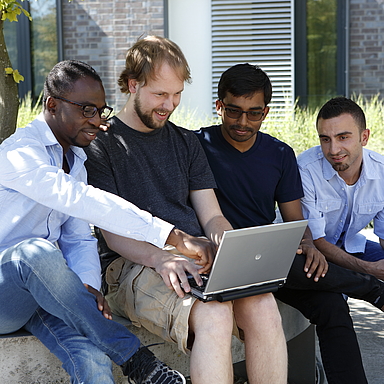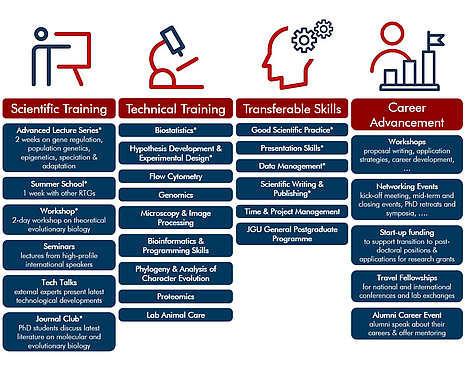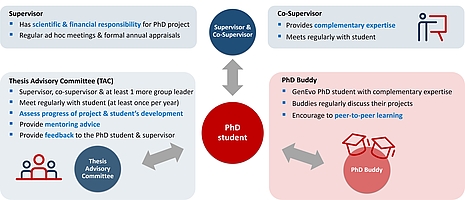About

What is a Research Training Group?
Research Training Groups (RTGs) are established by universities to promote early career researchers. RTGs concentrate on the qualification of PhD student within the framework of a focused research programme and a structured training strategy. The German Research Foundation (DFG) funds RTGs for a period of nine years. A small team of professors with proven expertise in the main topic runs the RTG: They provide supervision for >30 PhD students.
The DFG has granted the JGU funding for the RTG on "Gene Regulation in Evolution” (GenEvo) in 2019. The project has recently been extended for another 4.5 years (2nd funding period: January 2024 until June 2028).
What is GenEvo's core research idea?
The scientific aim of GenEvo is to gain a better understanding of the evolution of complex and multi-layered gene regulatory systems. We investigate which regulatory processes are evolutionarily conserved, which are prone to change, and which selective regimes they are subject to. By transferring methods developed for model species to other taxa, we study gene regulatory evolution in a broader intra- and interspecific context
What is the particular strength of GenEvo?
GenEvo brings together scientists from evolutionary and molecular biology. It aims to solve a number of recent research questions and to train a new, interdisciplinary generation of PhD students in subjects that are rarely taught in combination: evolutionary inference, epigenetics, gene regulation, omics techniques and bioinformatics.
The PhD students get training and guidance in both research fields to ensure an optimal collaboration within the RTG for best results and personal development.
What does the qualification programme involve?
The central goal of GenEvo’s qualification programme is to support our PhD students in their research projects and to provide them with a broad and interdisciplinary education to prepare them for a successful career in life sciences.
Find out more about Scientific Training & Seminars
Find out more about Technical Training
Find out more about Transferable Skills Training
Find out more about Career Advancement
How are PhD students guided in GenEvo?
Strong interdisciplinary supervision enhances the successful collaboration between Molecular Biology and Evolutionary Biology. The GenEvo Supervision Strategy is based on 4 pillars: Supervisor, Co-Supervisor, Thesis Advisory Committee and PhD Buddy.
What about the scientific and academic environment of GenEvo?
The scientific focus of GenEvo is established on and complements existing expertise and research activities in Mainz. Firstly, evolutionary biology is a clear research focus of JGU’s Faculty of Biology as manifested by the Institute of Organismic and Molecular Evolution, which was founded in 2017 and of which the spokesperson of GenEvo is executive director. Secondly, there is a strong focus on gene regulation in Mainz within the Faculty of Biology, at the Institute of Molecular Biology (IMB) and University Medicine. GenEvo brings together those expertises. Hence, it promotes collaborations and synergies within the Faculty of Biology and with other institutions, notably IMB.
The RTG synergises with the International PhD Programme (IPP) on “Gene Regulation, Epigenetics & Genome Stability”. This collaboration enables:
- a competitive recruitment selection process for excellent, international PhD candidates,
- a professional management infrastructure,
- a strong framework for the exchange of tools, knowledge and approaches in gene regulation
- and a very broad offer of training courses for our PhD students.

How does GenEvo ensure that all members have equal opportunities?
Equal opportunities, the promotion of women and support for families are integral parts of JGU’s mission statement, strategic concept and constitutional framework. JGU has a dedicated Equal Opportunities Office that advises on gender equality issues and develops measures to pursue equal opportunities. To support young families, JGU offers advice and services to parents via its Family Service Office, including e.g. daycare centres, emergency childcare, and a school holiday programme.
In addition to the equal opportunities measures provided by JGU, the RTG 2526 offers the following support to its members:
Career support for female scientists
- Dedicated professional skills workshops for female scientists
- Seminars/career talks on career-related topics by female role models
- Individual coaching and mentoring
- Travel grants for female scientists to participate in networking events and conferences
Gender and diversity awareness
- Training for all project leaders to guarantee fair recruitment and leadership
- Training on unconscious bias and gender awareness
- Gender equality ombudsperson
Family support
Currently, there are no parents in the PhD students consortium, but if required, additional support like technical assistance or home office workspace will be offered.
How to join GenEvo as PhD student
A new call for the programme is now open.
Please go to Application.
How to contact us
Mailing address:
DFG Research Training Group 2526 “GenEvo”
Institute for Molecular Biology gGmbH
Ackermannweg 4
55128 Mainz
Germany
Phone: +49 (0) 6131-39-28708
email
________________________________________
Spokesperson: Prof. Susanne Foitzik
Spokesperson: Prof. René Ketting
Coordinator: Dr. Judith Kochmann

